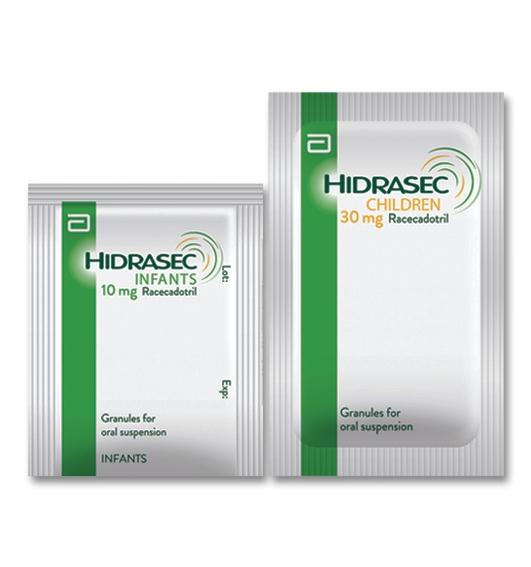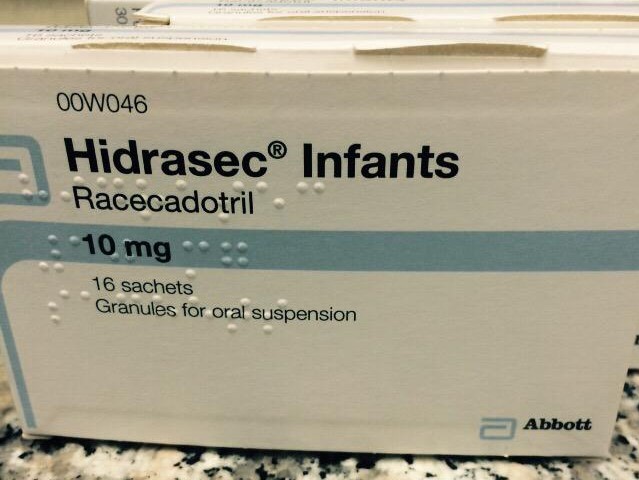Hidrasec: Uses, Dosage, How it Works, Side Effects, Interactions

What is Hidrasec?
Hidrasec is a brand of Racecadotril, also known as acetorphan the first truly intestinal antisecretory drug to gain approval for the treatment of diarrhea. Hidrasec is used in the treatment of acute diarrhea in adults and children over the age of three months.
Diarrhea is loose, watery stools (bowel movements). You have diarrhea if you have loose stools three or more times in one day. It may be present alone or be associated with other symptoms.
Hidrasec is available as 100 mg capsules and 10, 15, and 30 mg sachets containing granules or powder for oral suspension. This medication should not be used to treat diarrhea associated with fever, bloody or purulent stools as well as antibiotic-induced diarrhea.
How it works
Hidrasec is an oral enkephalinase inhibitor that works by preventing the degradation of endogenous enkephalins and reducing the hypersecretion of water and electrolytes into the intestinal lumen.
When taken orally, the medication is rapidly converted in the body to thiorphan, a potent enkephalinase inhibitor that decreases the flow of fluids and electrolytes into the bowel slowing down the movement of the bowel to decrease the number of bowel movements. This allows more fluid to be absorbed into your body which helps in having less diarrhea and more formed and bulky stools.
Hidrasec starts working almost immediately exerting peak effects within 1 hour. A single dose of Hidrasec can last for up to 8 hours after oral administration.

Hidrasec dose for adults and children
The recommended dose of Hidrasec for adults, children, and infants over the age of three months is as follows:
Adult: The recommended start dose of Hidrasec for adults is 1 capsule (100 mg) taken 3 times daily until your bowel movements return to normal. The first dose may be taken with or without food but subsequent doses should be preferably taken before meals. Do not use this medication for more than 7 days.
Children: The recommended start dose of Hidrasec granules or powder for oral suspension in combination with oral rehydration salt (ORS) for children is 20mg – 30mg taken 3 times daily until your child’s bowel movements return to normal. Hidrasec granules or powder can be added to food or dispersed in a glass of water or in the feeding bottle for infants. The powder may also be administered directly into the mouth of a child.
If your child’s diarrhea lasts longer than 48 hours or gets worse, or you’re otherwise concerned about his or her health, consult your healthcare professional. Do not use this medication for more than 7 days.
Follow the directions on your prescription label carefully, and ask your doctor or pharmacist to explain any part you do not understand. Take Hidrasec exactly as directed. Do not take more or less of it or take it more often than prescribed by your doctor.
When is the best time to take Hidrasec?
Hidrasec should be taken as soon as possible after the onset of diarrhea. The medication should be taken at regular intervals until the diarrhea stops. Divide your dosing times as evenly as possible or every 8 hours because Hidrasec needs to be taken three times a day.
To ensure Hidrasec works well, you should avoid sweetened fluids like soft drinks, energy drinks, sugar water, and undiluted fruit juices. These all contain sugar, which can worsen diarrhea symptoms. As symptoms improve, giving your child soft, bland foods – such as bread, rice, yogurt, and bananas – can help restore the natural rhythm of the gut.
What are the side effects of Hidrasec?
Hidrasec can cause minor side effects which can include:
- Abdominal distension
- Headache
- Tonsillitis (particularly in infants or children)
- Constipation
- Urticaria
Hidrasec can also cause severe side effects such as an allergic reaction. Get emergency medical help if you have signs of an allergic reaction to Hidrasec: hives; difficulty breathing; swelling of your face, lips, tongue, or throat.
In rare cases, Hidrasec may cause a severe skin reaction that can be fatal, even if you took acetaminophen in the past and had no reaction. Stop taking this medicine and call your doctor right away if you have skin redness or a rash that spreads and causes blistering and peeling.
If you experience a serious side effect, you or your doctor may send a report to the Food and Drug Administration’s (FDA) MedWatch Adverse Event Reporting program online (http://www.fda.gov/Safety/MedWatch) or by phone (1-800-332-1088).

What medications can interact with Hidrasec?
Several medications may interact with Hidrasec including angiotensin-converting enzyme (ACE) inhibitors taken to help relax the veins and arteries to lower blood pressure. Examples of ACE inhibitors include:
- Benazepril (Lotensin)
- Captopril
- Enalapril (Vasotec)
- Fosinopril
- Lisinopril (Prinivil, Zestril)
- Moexipril
- Perindopril
- Quinapril (Accupril)
- Ramipril (Altace)
- Trandolapril
This list is not complete. Other drugs may interact with Hidrasec, including prescription and over-the-counter medicines, vitamins, and herbal products. Not all possible drug interactions are listed here.





